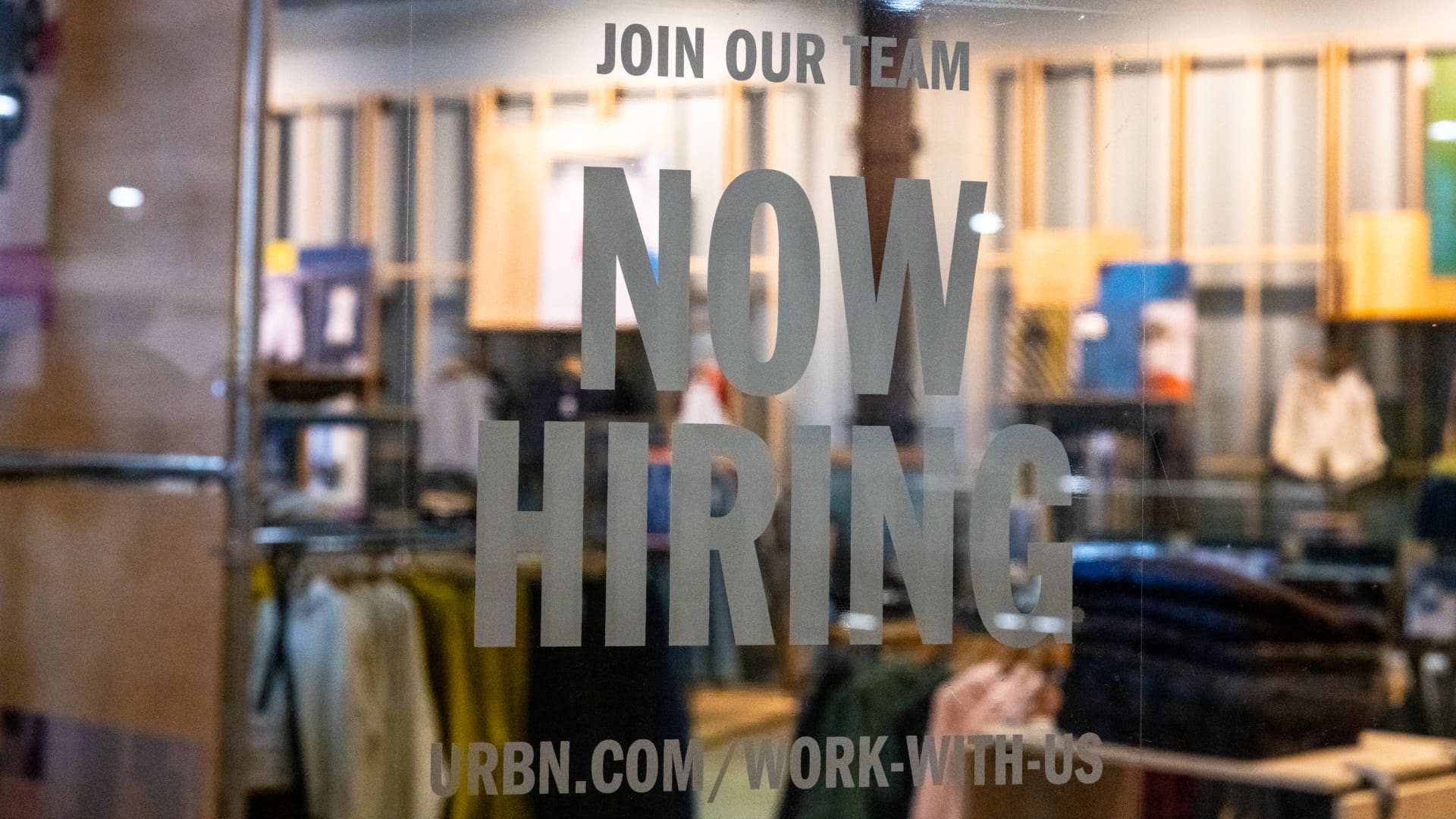A hiring sign is posted on the exterior of Urban Outfitters at the Tysons Corner Center mall on August 22, 2024 in Tysons, Virginia.
Anna Rose Layden | Getty Images
September’s outsized payrolls boost takes the U.S. economy out of the shadows of recession and gives the Federal Reserve a fairly open glide path to a soft landing.
If that sounds like a Goldilocks scenario, it’s probably not far from it, even with the lingering inflation concerns that are straining consumers’ wallets.
A gravity-defying jobs market, at least a slowing pace of price increases and declining interest rates puts the macro picture in a pretty good place right now — a critical time from a policy and political standpoint.
“We’ve been expecting a soft landing. This just gives us more confidence that it seems to remain in place,” Beth Ann Bovino, chief economist at U.S. Bank, said after Friday’s nonfarm payrolls report. “It also increases the possibility of a no-landing as well, meaning even stronger economic data for 2025 than we currently expect.”
The jobs count certainly was better than virtually anyone figured, with companies and the government combining to boost payrolls by 254,000, blowing away the Dow Jones consensus for 150,000. It was a big step up even from August’s upwardly revised numbers and reversed a trend that started in April of decelerating job numbers and rising concern for a broader slowdown — or worse.
Beyond that, it virtually eliminated any chance that the Federal Reserve would be repeating its half percentage point interest rate cut from September anytime soon.
In fact, futures markets reversed positioning after the report, pricing in a near-certain probability of just a quarter-point move at the November Fed meeting, followed by another quarter point in December, according to the CME Group’s FedWatch gauge. Prior, markets had been looking for a half-point in December followed by the equivalent of quarter-point cuts at each of the eight Federal Open Market Committee meetings in 2025.
Not a perfect picture
No more, though, as the Fed, barring any more disappointments from the labor market, can stake a moderate pace through its easing cycle.
“If we continue to see a stronger than expected economy that may give the Fed reasons to slow the pace of rate cuts through 2025 with that exit rate being a little bit higher than they currently expect, all with the economy still maintaining its strength,” Bovino said. “That would be good news for both the Fed and the economy.”
To be sure, there remain some blemishes in the jobs picture.
More than 60% of the growth for September came from the usual suspects — food and drinking establishments, health care and government — that have all been the beneficiaries of fiscal largesse that has pushed the 2024 budget deficit to the brink of $2 trillion.
There also were a few technical factors with the report, such as a low response rate from survey participants, that could cast some clouds over Friday’s sunny report and lead to downward revisions in subsequent months.
But broadly speaking, the news was very good and raised questions over just how aggressive the Fed will need to be.
Questions for the Fed
Bank of America economists, for instance, asked “Did the Fed panic?” in a client note referencing the half percentage point, or 50 basis point, cut in September, while others wondered about the wild vacillations and miscalculations among Wall Street experts. David Royal, chief financial and investment officer at financial services firm Thrivent, speculated that “it is doubtful” the Fed would have cut by so much “if it had known this report would be so strong.”
“The question becomes, how does everybody keep getting it wrong?” said Kathy Jones, chief fixed income strategist at Charles Schwab. “How is it we can’t get this number right with all the information we get?”
Jones said the Fed will have a dilemma on its hand as it figures out the proper policy response. The FOMC next meets Nov. 6-7, right after the U.S. presidential election and following a five-week span during which it will get plenty more to digest.
Some commentary after the meeting suggested the Fed may have to raise its estimate of the “neutral” rate of interest that neither boosts nor restricts growth, an indication that benchmark interest rates will settle at a higher place than they have in the recent past.
“What does the Fed do with this? Certainly, 50 basis points is off the table for the next meeting. I don’t think there’s any case to be made there,” Jones said. “Do they pause? Do they do another 25 [basis points] because they’re still far from neutral? Do they just weigh this against other data that might not be as strong? I think they have a lot of figuring out to do.”
In the meantime, though, officials are likely to be content knowing that the economy is stable, the labor market isn’t in nearly as much trouble as had been suspected, and they have time to weigh their next move.
“We’ve witnessed a pretty remarkable economy over the past few years, despite some naysayers and lackluster consumer sentiment,” said Elizabeth Renter, senior economist at NerdWallet. “In an election year, passions run high and every economic report or event can garner intense reaction. But the economic aggregates tell us the U.S. economy has been and is strong.”

 Accounting1 week ago
Accounting1 week ago
 Economics1 week ago
Economics1 week ago
 Personal Finance1 week ago
Personal Finance1 week ago
 Accounting1 week ago
Accounting1 week ago
 Finance1 week ago
Finance1 week ago
 Economics1 week ago
Economics1 week ago
 Economics1 week ago
Economics1 week ago
 Economics1 week ago
Economics1 week ago






















